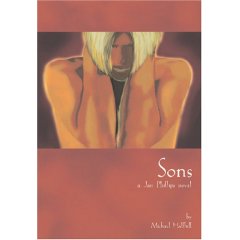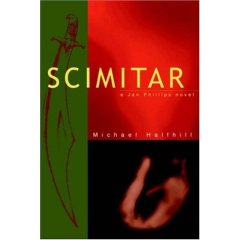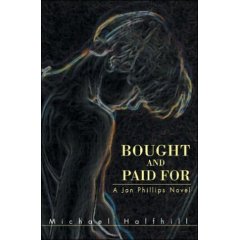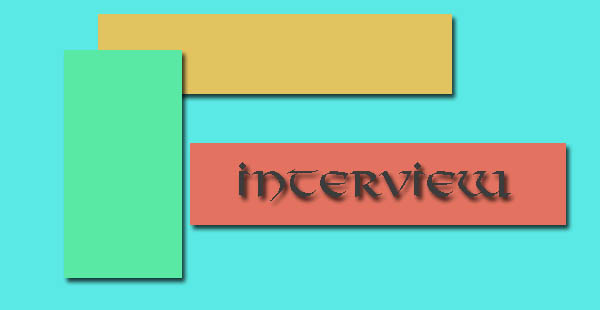MICHAEL HALFHILL The sun was bright and made the Brew Ha Ha café, in Philadelphia , an even more pleasant and hospitable place to chat over tea. Michael Halfhill's equally sunny disposition turned the experience into an enjoyable time. The hours ticked by and neither of us noticed. It was all quite a lot of fun. Aside from being a talented writer with something to say, Michael is partnered to a wonderful man and both of them share an interest in showing their prize-winning borzoi hounds at dog shows around the country. Learning some of the backstory behind Bought and Paid For , Scimitar , and his new book, Sons was a treat. Michael is adept at spinning out stories and remembers doing so from an early age. He would notice this person or that as he traveled on public transportation and, like any good writer, he wondered what their story was. Of course, he would make up stories for each of them to feed his curiosity and exercise his imagination. It became a well-developed skill and has served him well in his work as a writer. Sons is the third book in the tale of Jan Phillips. Will there be another? Michael has already begun thinking out the plot lines and is debating just how he wants to present the work. We hope that Mysterical-E will get a sneak peek to share with our readers. Michael's partner, Peter Kim, did the covers for his work. They are well-executed and beautiful and fit well the stories contained within. What better kind of working partnership can there be? What is your approach to writing a novel: that is, do you outline or not?
No I don't outline. What I do is, I write the first chapter and then I write the last chapter. Writing my last chapter gives me a terminus, a goal if you like. This doesn't mean I'm committed to the ending. With my first book Bought And Paid For I wrote three possible endings. By the time the story unfolded I realized I was going to write a sequel, those scenes no longer applied and so I wrote a different end. Do you keep files and piles of notes?
Well sorta. I keep a note pad with me and I jot down lines that come to me or scenes that creep in my mind—usually at the oddest times and places—like in a dentist's chair. When I get the chance I type these into a word file I call “interleaves”. Later I mine these entries for nuggets. 
What are some of the tricks, pitfalls, etc. that you need to keep in mind when writing a mystery novel/story?
I think for me the most serious pitfall I encounter is in my narratives. For example, my books have various venues that cover, Philadelphia , Europe, North Africa, and Asia . It's obvious my characters travel a lot and yet I hate writing what I call “travelogue” and so I tend to speed up these sequences. Another pitfall is expecting the reader to know instinctively what's in my mind without writing it down. That's probably the biggest mistake most new writers make. As for tricks, I don't use many. I do keep a large Post-it Note stuck on the edge of my computer. The Post-it has a big numeral five printed on it. This reminds me to examine each scene, and look for areas where I may have missed the five senses, especially the sense of smell, touch and taste. Writers tend to be good at detailing sight and hearing but we often neglect the other three senses, especially, touch. It's amazing to me how much I can add to a scene just by looking for places where these might apply.
What is it that kick starts a project for you: a character, a situation, or…?
Situations mostly—what's going on in today's world. After that I think the desire to explore a character—his or her inner thoughts and especially why he or she acts in a given situation. For this the reader needs to know the character's background. What are the underpinnings that make him or her unique and at the same time companionable to the reader; who in all likelihood has never headed up a secret organization, or ordered a killing or fought a terrorist hand to hand on an Icelandic glacier?
What started you in writing?
Boredom in retirement.
What kept you going?
Vanity. I liked all the good things people were saying about my work.
Can you tell us a bit about the first book you had published -- how did that come about?
Bought And Paid For was my first novel. The main character in all three books is Jan Phillips. At the beginning of Bought And Paid For he's a youth of eighteen. By the final chapter he's in his late twenties. In some ways Bought And Paid For is autobiographical—at least as far as emotions go. In other ways this story mirrors my disillusion with religion (not to be confused with faith) and bigotry. Held within the obvious themes of a cross-generational love, adventure, and intrigue Bought And Paid For is a story of choices—good choices for the wrong reasons and bad choices for the right reasons and all the consequences that flow from them. Truth be, told I had no intention of publishing anything. I was simply having a good time writing creatively. I was happy to shed the braces that writing scientific data imposes on expression. And how do you feel about it now? Bought And Paid For is like a firstborn—all crabby and red faced. I love that book wrinkles and all. 
How have you grown as a writer?
The word that comes to mind is patience. I've had to resist the temptation to hurry a project. I've learned to go slower, to rely on my beta readers for their view of what's working and what's not. I also learned to let go. It's hard to do when I've spent so much time crafting a scene that simply isn't right for the book.
What has gotten better?
Expression—I think. As I progressed onto Scimitar the sequel of Bought And Paid For , and then on to Sons I began exploring the inner soul of Jan Phillips, my main character. I came to feel that the thrill aspects of his life were less satisfying to me as the man himself. What things have you dropped along the way? My first book dealt harshly with my characters. Subsequently I've become more sympathetic toward them.
What are the three most important pieces of advice you'd give to writers? 1) Write the best story you can with your native knowledge of the subject and after that, research the aspects of the story that are beyond your immediate experience.
2) Don't fool yourself you into thinking you can edit your own work. You're too close to the subject to be objective.
3) Get as many beta readers you can to give you a no holds barred opinion of the work. If you've written well that's great. If you've written a dud there's no point in breaking your heart on it. Go write another story.
How long does it generally take you to complete a novel – from conception to completion?
I wrote Bought And Paid For in five weeks. Scimitar took about a year to complete while third book, Sons, took a year to type out and another year for beta readers and my editor help me provide a finished product.
How many revisions do you normally go through when writing a novel?
None. I may revise / delete a scene or add a scene but I've never “revised” a whole story.
What's the most difficult stage in the writing for you?
Waiting for my beta readers to finish their analysis of the text. I know there will be work to do when theirs and the waiting makes me crazy.
Who are the authors that you admire most, who inspire you, whose writing you think is most beautiful, moving, exciting?
That's hard call. I don't compartmentalize these qualities and so I haven't given it any serious thought. Any response to that question would come up short on all counts.
Are there authors who you think are much better at spinning a plot as opposed to writing beautiful prose?
Yes. I think Sara Paretsky ( V.I. Warshawkski mysteries) is a master at plots. So is Elizabeth George. But for my money no one writes more beautifully than David Gregory Roberts ( Shantaram) ~ “ Night crowded the sky like a black net bursting with diamonds.” Can't beat that.
What do you find most satisfying in another author's book: a great plot, beautiful writing, fully realized characters?
All these are desirable, but characters that are memorable make a book worth the read.
In your own work, what do you think you are strongest at: plot, beautiful prose, character? Or something else?
I think my characters trump plot. My sentences tend to be terse so beauty often takes a backseat.
How do you plot a mystery or a thriller – what stymies you most, what do you find easiest?
My plots are modern day. Bought And Paid For has elements of the aftermath in the Bosnian / Serbian conflict. Scimitar is set partly in Sudan and has at its core human trafficking. While Sons is strongly influenced by the global terrorist crisis we face today.
What advice can you give on plotting a mystery?
Develop a strong and believable motive for the characters to act on. I think why people act is far more interesting than the act itself or even who has committed it. Instinctively readers will ask why long before they ask who.
Does the world you create in your non-series novels continue to live in your mind long after you've completed the novel? What implications does that have in terms of wanting to do a series in the same setting?
The short answer is yes. That's why I wrote the sequel. There was so much more for Jan Phillips to experience and learn about himself. I couldn't let him drift away.
When doing a series, how “into” the world of that series do you get?
The world Jan Phillips lives in is so far removed from my own that it can only exist in my imagination.
Do you constantly think about that world and compare it to reality, changing it or fixing it as you go along?
No. In my books Jan Phillips has a job, lives with a partner, has brothers and sisters. These get equal consideration along with his status as an international powerbroker.
What scares you about doing a series?
Getting stale.
What are the advantages/disadvantages of series characters?
For me I guess it would be the opportunity to develop my characters as I develop as a writer. Or maybe it's the other way round, perhaps my characters are helping me write better.
What other kinds of writing do you do?
I write social commentary—essays from my personal viewpoint.
What tips do you have for beginning writers?
Study your subject. If you want to write a mystery, read lots of mystery. Learn what aspects of mystery intrigue you, be that setting or era or location or timeline. Be careful not to fall into the trap of writing more than is necessary; beta readers are a good barometer for this. When a reader skips text to get to the good part you know you've written too much.
What about readers – how have they received your books – do you hear from them, have any problems arisen, or any good/funny/touching experiences happened with regard to readers?
All three of my books have been well received. I do hear occasionally from readers. I haven't had any problems with my readership. Those who have issues with my books have confined their remarks to adding reviews on Amazon.com rather than contacting me personally. Fortunately there have been few thumbs down. Recently a reader and his partner went to Philadelphia to see if they could locate the venues I describe in my books. They got some—like McGillin's Ale House, Saint Peter and Paul Cathedral, The Venture Inn. I changed the names of some locations so these were not easily found. If anyone wants to take me to Europe I'll be happy to give a tour there! One email I got from a woman in Scotland was touching. She said that after reading Bought And Paid For she would often think of Jan Phillips and what he was doing and where life would take him. She wrote as if Jan were flesh and blood. That was very gratifying.
What is the most common type of fan mail you get?
Mostly fans ask when the next book will be out. They rarely ask me about my personal life. 
Have you developed any friendships with fans over the years? What do your fans most like about your books?
Yes I have made friends among readers and authors. Unfortunately few live near me so I don't have the luxury of their company.
Is the publication of each book as thrilling as that first one?
Sure. It's like falling in love each time.
What are your goals as a writer?
I'd like to move beyond fiction and do more essays. You know, commentary on the human condition.
Why do you think mystery is so popular?
People like puzzles.
Talk about your most recent book and what it means to you.
Sons is the tale of three sons and how their lives impact Jan Phillips. One [Soo] is murdered in Iraq by terrorists, one [Louis Carew] is a criminal and one [Colin] has lost his mother in a fire.
What sparked the idea? How long had you had this idea before starting to write?
I don't know why but I've always been fascinated with revenge as a motivator and the lengths people will go to satisfy their need to get back at someone for injuries, real or imagined. Sons has at its base this notion.
Did you feel compelled to write this book? About this subject?
Interestingly, I hadn't intended to write a third book with Jan Phillips as the lead character. Then I saw the video played on CNN of a nineteen year old Korean who was captured in Iraq . The video released by the terrorists showed the man pleading for his life shortly before he was murdered, beheaded actually. In the book I call him Soo, which in Korean means long life. His plight played very heavily in developing the over all plot for Sons.
How did you approach the planning and writing? Did you prepare an outline? Would you share your outlining and preparation processes?
I approached this book as I did the first two. I wrote the first chapter and then I wrote the last chapter. In fact the first chapter opens with Soo's murder and closes with Jan attempting to console the murdered son's parents.
How long did it take to complete it?
From start to finish, just under two years. What was your least favorite part in the writing of the book? Research. Usually I love researching my books but because this one had at its core a brutal murder it was difficult. I went on line and accessed a website that had aired the actual beheading of the Korean man. I'd never seen anyone murdered and certainly not in that manner. I'm still haunted by the sound. Anyway, I dutifully wrote it all down but when it came time to add the description into the book, I couldn't do it. I couldn't expose the last moments in that kind of detail to anyone. And so I left it to Soo's father—a surgeon—to tell Jan about his son's death. That way, for the reader's sake, I was able to mask the horror with the father's grief and anger. I hope I succeeded. What do you like best about it?
The complexity. Rather than take three stories and deal with each in turn, I braided the three sons and their stories, into a single line. Each brings his own avenue for those choices I spoke about earlier. Which are your favorite characters and why?
Of course my main character, Jan Phillips is my favorite. As Toby Grace of Out In Jersey Magazine wrote, “Jan Phillips is exactly who we all secretly wish we were. ” I hope he's right! I also like Nick Flamingo, the hardnosed private eye who uncovers the grimy underbelly of child sex trafficking as it's plied in one of Philadelphia 's warehouse districts by one of the sons.
Which are your favorite moments in the story?
Certainly Jan's interaction with Michael, his partner of twelve years is special. The freedom Michael exercises within the relationship is evident when he challenges Jan, “ Oh do not be so melodramatic. This is not about you after all. Wait to see what he has to say, and for heaven's sake, do not accuse him of anything—just see what it means.” With this gentle reproof, I demonstrate the parity Michael enjoys with Jan who through out the story is the dominant personality. I believe that parity in relationships is vital and I try to show that throughout the book.
The last chapter in the book resolves all crises and binds all wounds. This chapter is perhaps the one I worked hardest on. | 






